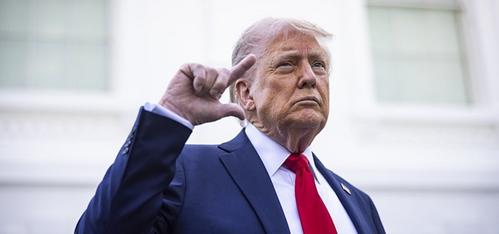Business
Trump Eyes ‘Fair Deal’ With China as Trade War Talks Stall

US President Donald Trump expressed optimism on Wednesday about securing a “fair deal” with China, despite ongoing tensions and a lack of clear progress in trade negotiations between the two global powers.
Speaking to reporters in Washington, Trump said that talks with Beijing are “active” and that he hopes for an agreement with Chinese President Xi Jinping. However, he added that lowering tariffs on Chinese goods would “depend on them,” referring to the Chinese government.
Tariffs Still in Place as Officials Offer Few Details
While Trump projected confidence, his top economic team offered little clarity. US Treasury Secretary Scott Bessent told reporters that “no direct discussions” are currently underway to reduce tariffs, even as both countries face pressure from businesses and international institutions to de-escalate the trade conflict.
“We’re not yet at the stage of tariff talks,” Bessent said on the sidelines of the International Monetary Fund and World Bank’s spring meetings. “I think both sides are waiting for the other to move first.”
Currently, the US has imposed tariffs of up to 145% on various Chinese imports, citing unfair trade practices and intellectual property theft. In retaliation, Beijing has slapped 125% tariffs on a range of American goods.
Bessent referred to the current tariff levels as “the equivalent of an embargo,” suggesting they are unsustainable for both economies.
Trump Maintains Strong Ties at the Top
Despite the gridlock, Trump emphasized his personal relationship with Xi as a potential bridge to progress. “I get along very well with President Xi,” he said, adding that top-level relationships are strong even if working-level talks are stagnant.
Bessent agreed, calling the personal connection between Trump and Xi both “a blessing and a curse,” as meaningful negotiations would need to happen below the presidential level.
Experts Warn of Market Pressure and Risky Concessions
Political analysts caution that Trump’s desire for a deal may be motivated more by market stability than long-term strategic gain. “He’s trying to keep the financial markets off his back,” said Duke University professor Joseph Grieco.
Grieco also warned that Trump may offer Xi a favorable deal that fails to address the deeper economic issues the US has with China, such as intellectual property violations and trade imbalances.
Exemptions and Mixed Signals
Trump’s administration has recently rolled out temporary exemptions for some tech products, including smartphones and chipmaking equipment. The Financial Times reports that auto parts could soon be added to the exemption list, although Trump denied any immediate changes to US auto tariffs on Wednesday.
The president also suggested Canadian auto imports might face higher levies, further complicating the trade picture.
No Timeline for Talks, But Possibility of De-Escalation
Bessent maintained that while there’s no formal timeline for restarting talks, a mutual de-escalation of tariffs is still possible. “No one benefits from this level of trade disruption,” he said.
At the same time, he criticized China’s export-driven economic model, calling it unsustainable and harmful not only to China but to global markets.
Despite the hardline rhetoric, Bessent stressed that the administration’s trade approach is not isolationist. “America first does not mean America alone,” he said, calling instead for fair partnerships and mutual respect among trading nations.
As Trump continues to signal hope for a “fair deal” with China, the reality behind the scenes tells a slower, more complex story. With tariffs still climbing and direct talks on hold, the path to de-escalation remains uncertain—though not impossible.
{Source: IOL}
Follow Joburg ETC on Facebook, Twitter , TikTok and Instagram
For more News in Johannesburg, visit joburgetc.com















